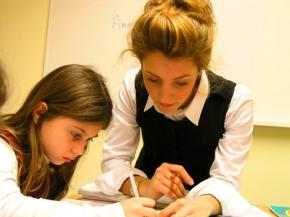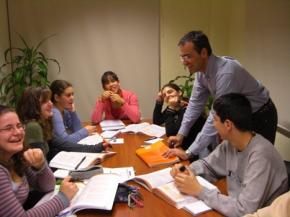How to Write a Poem
Writing a poem is all about observing the world within you or around you. You can write about anything from love to the rusty gate at the old farm. As long as you are enjoying it or finding it releases something from inside you, you're on the right track. There are several things that one must consider while wondering how to write poetry. Here is a list of things to think about that, hopefully, will make the process easier for you.

(η κ. Ελίζα Γιαννακοπούλου με τη μαθήτρια Ελένα Παπαδοπούλου, επίπεδο 500)
1. The Subject.
Commonly known as the ‘Theme’ of the poem, this is the important starting point and central point of your work. What is the poem all about? What are you trying to get across to the world at large, via your poem? Is it a story, an experience, a description of events, or a description of a place? An interesting way to take the jump from this point is writing down the words, phrases or sentences that come to your mind when you are thinking about the subject or the theme of your poem. Don’t worry if nothing sounds or feels right, just write it down for now. Allow yourself to put all your ideas into words. Do not be afraid to voice your exact feelings. Emotions are what make poems, and if you lie about your emotions it can be easily sensed in the poem. Write them down as quickly as possible, and when you're done, go through the list and look for connections or certain items that get your creative juices flowing.
2. Use concrete imagery and vivid descriptions.
Love, hate, happiness: these are all abstract concepts. Many, maybe all, poems are, deep down, about emotions and other abstractions, but it's hard to build a strong poem using only abstractions - it's just not interesting. The key, then, is to replace or enhance abstractions with concrete images, things that you can appreciate with your senses: a rose, a shark, or a crackling fire, for example. Really powerful poetry not only uses concrete images; it also describes them vividly. Show your readers and listeners what you're talking about--help them to experience the imagery of the poem. Put in some "sensory" handles. These are words that describe the things that you hear, see, taste, touch, and smell, so that the reader can identify with their own experience. Give some examples rather than purely mental/intellectual descriptions. For example: "He made a loud sound" versus "He made a loud sound like a hippo eating 100 stale pecan pies with metal teeth".
3. Use poetic devices to enhance your poem's beauty and meaning.
The most well known poetic device is rhyme. Rhyme can add suspense to your lines, enhance your meaning, or make the poem more cohesive. It can also make it prettier. Don't overuse rhyme. It's a crime. In fact you don't have to use rhyme at all. Other poetic devices include simile, metaphor, symbols and repetition. Poetic devices can make a poem or, if they bring too much attention to themselves, they can ruin it. Remember, you don’t have to use rhyme. You can also try free verse. Most modern poets often use the free verse style of poetry. Although, to the beginner, this style may not have a formal structure and sound easy to write in, look closely at the work of popular free verse poets and you will find a basic form lurking somewhere.
A. RHYME
True rhyme is characterized by identical sound that starts with the accented vowel in both words and continues on to the end of the word. Some examples of true rhyme are ocean/motion, tropic/myopic, hand/understand. Examples: I went to the store (a) To buy some milk (b) But I found something more (a) A scarf of silk. (b)
A. RHYME
A Poison Tree by William Blake
I was angry with my friend; I told my wrath, my wrath did end. I was angry with my foe: I told it not, my wrath did grow. And I waterd it in fears, Night and morning with my tears:And I sunned it with smiles, And with soft deceitful wiles. And it grew both day and night, Till it bore an apple bright. And my foe beheld it shine, And he knew that it was mine. And into my garden stole. When the night had veiled the pole; In the morning glad I see, My foe outstretchd beneath the tree.
B. SIMILE
Harlem by Langston Hughes
What happens to a dream deferred? Does it dry up Like a raisin in the sun? Or fester like a sore And then run? Does it stink like rotten meat? Or crust and sugar over- Like a syrupy sweet Maybe it just sags Like a heavy load Or does it explode?
C. SYMBOL
The Road Not Taken by Robert Frost
Two roads diverged in a yellow wood, And sorry I could not travel both And be one traveler, long I stood And looked down one as far as I could To where it bent in the undergrowth; Then took the other, as just as fair, And having perhaps the better claim, Because it was grassy and wanted wear; Though as for that the passing there Had worn them really about the same, And both that morning equally lay In leaves no step had trodden black. Oh, I kept the first for another day! Yet knowing how way leads on to way, I doubted if I should ever come back. I shall be telling this with a sigh Somewhere ages and ages hence: Two roads diverged in a wood, and I— I took the one less traveled by, And that has made all the difference.
D. METAPHOR
Truth by Stephen Crane
“Truth,” said a traveller, “Is a rock, a mighty fortress; Often have I been to it, Even to its highest tower, From whence the world looks black.” “Truth,” said a traveler, “Is a breath, a wind, A shadow, a phantom; Long have I pursued it, But never have I touched The hem of its garment.” And I believed the second traveller; For truth was to me A breath, a wind, A shadow, a phantom, And never had I touched The hem of its garment.
E. FREE VERSE
Since feeling is first by e. e. cummings
since feeling is first who pays any attention to the syntax of things will never wholly kiss you; wholly to be a fool while Spring is in the world my blood approves, and kisses are a better fate than wisdom lady i swear by all flowers. Don’t cry -the best gesture of my brain is less than your eyelids’ flutter which says we are for each other: then laugh, leaning back in my arms for life’s not a paragraph And death i think is no parenthesis









